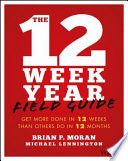

The 12 Week Year Field Guide presents a revolutionary approach to productivity and goal achievement by condensing the traditional annual planning cycle into a focused 12-week period. The book is grounded in the idea that...
Continue readingThe central premise of the 12 Week Year is to condense the traditional annual planning cycle into a 12-week period. This approach allows individuals and teams to focus on shorter time frames that lead to increased urgenc...
Continue readingSetting effective goals is critical to the success of the 12 Week Year framework. The book emphasizes the need for SMART goals—Specific, Measurable, Achievable, Relevant, and Time-bound. By ensuring that goals meet these...
Continue readingEffective planning is a cornerstone of the 12 Week Year methodology. The guide outlines a structured approach to weekly and daily planning that helps individuals prioritize their tasks and allocate their time effectively...
Continue readingAccountability is a critical element of the 12 Week Year framework. The guide emphasizes the importance of establishing support systems, whether through accountability partners, teams, or coaches, to help individuals sta...
Continue readingMeasuring progress and results is essential for understanding the effectiveness of the 12 Week Year approach. The guide encourages individuals to track their progress against their established goals regularly. This can i...
Continue readingThe 12 Week Year guide emphasizes that mindset plays a crucial role in achieving success. A positive and growth-oriented mindset can significantly impact an individual's ability to set and achieve goals. The book encoura...
Continue readingReflection and continuous improvement are integral components of the 12 Week Year methodology. The guide encourages individuals to take time at the end of each 12-week cycle to reflect on their achievements, challenges, ...
Continue readingThe reading time for The 12 Week Year Field Guide depends on the reader's pace. However, this concise book summary covers the 7 key ideas from The 12 Week Year Field Guide, allowing you to quickly understand the main concepts, insights, and practical applications in around 23 min.
The 12 Week Year Field Guide is definitely worth reading. The book covers essential topics including The Concept of the 12 Week Year, Setting Effective Goals, Weekly and Daily Planning, providing practical insights and actionable advice. Whether you read the full book or our concise summary, The 12 Week Year Field Guide delivers valuable knowledge that can help you improve your understanding and apply these concepts in your personal or professional life.
The 12 Week Year Field Guide was written by Brian P. Moran, Michael Lennington.
If you enjoyed The 12 Week Year Field Guide by Brian P. Moran, Michael Lennington and want to explore similar topics or deepen your understanding, we highly recommend these related book summaries:
These books cover related themes, complementary concepts, and will help you build upon the knowledge gained from The 12 Week Year Field Guide. Each of these summaries provides concise insights that can further enhance your understanding and practical application of the ideas presented in The 12 Week Year Field Guide.